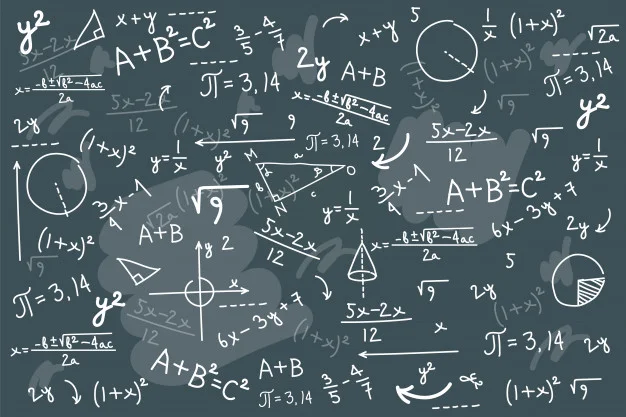
Mathematics is known as the mother of all sciences. Many people think that mathematics learns how to count, but in fact, mathematics is the science of how to read patterns.
If you want to go to college majoring in mathematics, many universities and colleges abroad can be chosen. There are many choices of overseas universities that you can make a destination to study in mathematics, including the United States, United Kingdom, or Singapore.
Mathematics graduates abroad will have adequate expertise to be able to make a career in various related fields.
What is Mathematics course all about?
Bachelor of mathematics basically involves a combination of pure and applied mathematics (pure vs applied mathematics).
Pure mathematics contains theory and abstracts while practical applications in real life will be studied in applied science.
Some institutions offer both types of mathematics in separate degrees, so you can choose to focus in just one field.
The stereotypes that still exist in society regarding mathematics majors do not stop there. Many also still think that graduates majoring in Mathematics only have job prospects as school teachers or lecturers only.
This generally makes middle or high school students reluctant to choose mathematics majors, but other majors that are more practical like engineering or management.
Mathematics graduates are well-known for their analytical thinking, logic, and problem-solving abilities.
The fields that require Mathematics graduates come from engineering, information technology, economics, banking, managerial, and more.
Although many engineering or management graduates have practical expertise, many math majors are skilled to solve complex problems that require higher thinking skills.
Also read: Everything about Actuarial Science course
Why study Mathematics?
Here are some reasons to continue studying mathematics:
1. Very high-income potential
Mathematics majors will have many opportunities for a career in various fields with very high earning potential. These fields include engineering, information technology, economics, finance, managerial, and various other fields.
By becoming a mathematics major, you can have a career in one of the many choices in these fields without worrying about the potential income that you will be able to earn.
2. Very wide choice of employment sectors
Not only will you be able to work in a private company, but you will also be able to work in various types of institutions.
Graduates from the mathematics department can be found in various government institutions, universities, and independent research institutions. You are also able to pursue a career as an academic or researcher.
3. Hone analytical and logical thinking abilities
If you have above-average cognitive abilities, majoring in mathematics may be the right place for you. Mathematics is not only a matter of counting but also about how to recognise problems and find solutions.
The thinking skills that you can hone in mathematics are going to be useful in your professional career in the private, government, and academic fields. You will also find it practical to make use of analytical and logical thinking skills in everyday life.
4. Opportunities for treading an international career
The best universities abroad are recognised by various accreditors from various countries and internationally.
Mathematics graduates from abroad will be acknowledged by various companies and institutions in various fields with international career paths.
What kind of subjects are taught in Mathematics course?
In the mathematics department, you will learn various things related to the scientific aspects of mathematics and the application of mathematics in certain fields. There are several branches of science from mathematics, including algebra, calculus, combinatorics, geometry, and statistics.
For example, some of the subjects that you will study in mathematics that you can find at Princeton University in the United States include:
1st year:
- Calculus Basics
- Calculus Survey
- Calculus
- Mathematics for Economics / Life Sciences
- Technical Introduction
2nd - 4th year:
- Multivariable Calculus
- Linear Algebra
- Vector Calculus
- Equation and Proof
- Honors Analysis
- Math logic
- Real Analysis
- Mathematical Modeling
- Complex Analysis
- Combinatorial Mathematics
- Probability and Stochastic Systems
- Differential Equations
- Geometry
- Random Process
- Cryptography
What are the specialisations in Mathematics?

Just like other fields of science, mathematics majors also have a specialisation or focus of expertise that is usually studied in the second year which can be adjusted to career goals after graduation later.
The fields of specialisation for mathematics majors are very diverse and can differ from one university to another. However, in general, the following focus of mathematics majors that you can choose while studying in this department are as follows:
1. Complex Analysis
This specialisation involves the investigation of complex numbers, i.e. numbers that can be expressed in possible combinations of real and imaginary numbers. This complex analysis is useful in various branches of mathematics, including algebraic geometry, applied mathematics and number theory.
You will learn about the analytic functions of various complex variables, complex functions and differentiation of complex functions, how various complex variables can be applied to the real world.
2. Discrete Mathematics
This specialisation involves a fundamentally discrete mathematical structure.
Topics studied include integers, graphs, sets, chromatic numbers and mathematical logic. Discrete mathematics usually involves examining the relationship between probability and combinatorics, algorithm complexity, how to use algorithmic thinking in problem-solving, asymptotic notation and calculus and partitions.
3. Mechanics
This specialisation centres on the study of forces that influence objects and the results of the movements experienced. Further studies on quantum mechanics and relativity include studying topics such as electromagnetism, Schrödinger's equation, Klein-Gordon equations, gamma matrix algebra and equivalent transformations.
You will also study statistical mechanics that studies topics such as inference, fluctuations, balance systems, transportation models and so on.
4. Measure Theory
This size theory specialisation is widely used in other fields in mathematics, such as geometry, probability theory, dynamic systems and functional analysis.
In this specialisation, you will study topics such as the definition of measurable space, measurement steps, integral to size, Lebesgue-Stieltjes and Lebesgue sizes and many others.
5. Fractal Geometry
In this specialisation, you will learn about fractals which are geometric shapes that display the same patterns on all magnification scales that make them look the same when viewed from near or far.
In this specialization you will dwell on the Cantor set, Mandelbrot set and Koch snowflake.
6. Fluid Dynamics
This specialisation is perfect for those of you who have an interest in engineering and aerospace. Fluid dynamics will reciprocate about fluid phenomena on various scales from a mathematical angle.
You will study topics such as ordinary and partial differential equations, basic mechanics and multivariable calculus, managing equations, vortices and many others.
What skills do you need to study Mathematics?
Following are the ideal characteristics of students majoring in mathematics:
1. Enjoy doing maths
If you like math subjects during elementary, middle, and high school, then you will be comfortable taking lectures in the mathematics department.
Not only does it require you to be good at math, but the core of true mathematical science is also being able to model events that occur around us in mathematical form. For that, the mathematical abilities that you gain during school will develop very rapidly.
2. Creative
Creativity in mathematics is measured in several aspects. In solving a mathematical problem, good mathematics students are required to be able to produce unique, varied solutions, and be able to explain these results clearly, both mathematically and verbally.
To fulfil this, not only numerical and analytical skills are needed. Good mathematics students also need good communication skills or ways to convey ideas clearly.
3. Has a special ability to resolve problems
In contrast to courses in other related fields, problems in mathematics may have more than one solution. You may feel you have found a solution to a problem, but what if the problem has another answer that is also correct?
Courses in mathematics will train you to approach a problem in various ways and in the process, you might find more than one solution for one problem.
4. Able to understand complex concepts
Most concepts in mathematical science are not easy to understand. To understand this complex concept, extensive skills and insights are required.
One of the easiest ways to understand a complex concept is through examples or case studies. If you enjoy reading a lot of things, you might have the ability to understand complex concepts through examples you've read.
If you feel you have all the characters mentioned above, you are the right person to undergo lectures in the mathematics department.
You have the potential to be accepted by the mathematics department and be able to graduate with satisfactory results.
Which best universities abroad offer Mathematics course?
Many universities and academies that you can choose abroad if you want to study mathematics.
Here is a list of some of the best universities abroad in the field of mathematics according to QS Universities:
|
University |
Location |
World Rankings |
|
United States of America |
1 |
|
|
United States of America |
2 |
|
|
United States of America |
3 |
|
|
English |
4 |
|
|
English |
5 |
|
|
United States of America |
6 |
|
|
United States of America |
7 |
|
|
Switzerland |
8 |
|
|
United States of America |
9 |
|
|
English |
10 |
Some other favourite countries in the world that are generally the destination countries to continue their studies in the mathematics department include:
What are the job prospects and salary Mathematics graduates?

The career prospects of graduates majoring in mathematics are located in various fields.
If you major in pure mathematics, your career prospects lie in academia or research.
Meanwhile, if you majored in applied mathematics, the possibility of fields related to your career prospects is very broad.
Some career prospects that are possible mathematics graduates include:
- Mathematician
- Actuary
- Financial planner
- Investment analyst
- Statistician
- Software Programmer
- Operations research analyst
- Accountant
- Lecturer
- School teachers
- Researcher
- Cost estimator
- Data analyst
- Information systems engineer
Salaries that you can get as a graduate majoring in mathematics abroad are generally very high, depending on the field of work.
For example, the following are the general careers taken by mathematics graduates in the United States and their salary range according to PayScale:
|
Profession |
Salary Range |
|
Actuary |
51,000 - 146,000 USD per year |
|
Financial analyst |
45,000 - 80,000 USD per year |
|
Data analyst |
42,000 - 84,000 USD per year |
|
Software Programmer |
59,000 - 132,000 USD per year |
|
Operations research analyst |
40,000 - 76,000 USD per year |
|
School teachers |
32,000 - 69,000 USD per year |
|
Lecturer |
36,000 - 80,000 USD per year |
What are the entry requirements?
Each university in the world of mathematics has different requirements to be able to accept new students majoring in mathematics.
This requirement depends on the policies of each university in various countries in the world.
|
Programme |
Entry Requirements |
|
Foundation/ Pre-U/A-level |
SPM /O-level: minimum 5 credits including English, Mathematics or relevant Science subjects (Physics/Biology/Chemistry) |
|
Diploma |
SPM /O-level: minimum 3- 5 credits including English, Mathematics or relevant Science subjects (Physics/Biology/Chemistry) |
|
Bachelor’s Degree |
Minimum CGPA of 2.5-3.0 in one of the following: - Foundation - Diploma - A-level - STPM |
How long will the programme take?
The duration of studies will depend on the university where the course that is taken.
|
Course Level |
Course Length |
|
Diploma Courses |
1-2 years |
|
Undergraduate Courses |
3-4 years |
|
Master Courses |
1-2 years |
How much does it cost to study Mathematics abroad?
Tuition fees abroad vary depending on the country, university, and chosen majors. Here are the estimated average annual tuition fees for mathematics majors in some of the best universities in the United States:
|
Massachusetts Institute of Technology (MIT) |
USD 53,450 |
|
Stanford University |
USD 52,450 |
|
Harvard University |
USD 67,580 |
|
Princeton University |
USD 73,450 |
|
University of California, Berkeley (UCB) |
USD 47,293 |
These costs are only tuition and do not include living expenses. The cost of living to study abroad depends on the country and city where the university is located.
FAQ
1. Do graduates majoring in mathematics only have job prospects as teachers or lecturers?
No! In fact, there are many graduates majoring in mathematics who work in various fields. These fields include industry, finance, energy, engineering and engineering consulting, aviation, and many more.
Today many companies need math graduates as data analysts and managerial staff.
This certainly does not rule out your possibility to become a teacher, lecturer, or researcher if you wish to pursue a career in academia or research.
2. If I am interested in working in a private company, is majoring in engineering, management or economics better than mathematics majors?
Each course has its own shortcomings and weaknesses. Graduates majoring in management or economics will certainly have more expertise in the field of managerial or financial and economic analysis, while graduates majoring in engineering have specificities in the fields of technology and engineering in accordance with the engineering fields taken.
However, many companies require graduates majoring in mathematics to strengthen data analysis or make mathematical models that are useful for explaining in more detail about a problem or forecasting. In this case, graduates majoring in mathematics are generally superior.
If you are still confused to determine the right course for you if you are interested in a career in a private company, you should choose a course that suits your interests and abilities.
You can also contact EasyUni to be able to consult on what course you should choose.
3. How do I prepare myself for college in mathematics course?
You will find many problems related to understanding mathematical concepts and theories as well as related to the application of mathematics.
You can prepare yourself from now on by practising many math exercises. Not just a matter of calculation, but also a matter of solving a problem.
You can also broaden your knowledge through books or articles and readings on the internet about economic, industrial and information technology issues. You will need broad insights if you are interested in majoring in applied mathematics.
4. How to choose a good campus to study mathematics?
You should choose a campus that you feel suits you best. Some factors that you can consider include the campus environment, location, and price.
You might be able to consider many mathematics majors abroad that are not included in the top 10.
You can get various information about mathematics majors abroad on the internet. If you have made up your mind to continue studying in mathematics course abroad, you can immediately prepare the documents and requirements for the registration process from now on. All the best!
 +60142521561
+60142521561
















